
The rain and thunder roaring outside of the Charles B. Wang Center on Thursday evening added to the magic of Amir Vahab and his ensemble’s music, as they brought to life 13th and 14th-century poetry from Sufi poets Rumi, Hafiz, Baba Taher and Yunus Emre.
Vahab has been hailed by The New York Times as the “ambassador for a silenced music,” and is considered one of New York’s most distinguished composer/vocalists of Sufi and folk music. He sings in many different languages with his own particular mystical style.
Vahab uses instruments and songs of the Middle East, including from Persian, Turkish and Azeri cultures. As an instrumentalist, he plays and teaches a number of instruments specific to the culture which have survived through time. Vahab has been coming to the Charles B. Wang Center sporadically to perform since 2002 when the center opened.
Vahab introduced the Sufi tradition to the audience as “the mystical heart of Islam”, and the performances proved that it was exactly that. Sufism is a mystical Islamic belief and practice in which Muslims seek to find the truth of divine love through the direct, personal experience of God. It values nurturing about a human relationship with the divine.
Early Sufism came about as a reaction to the secular nature of the Umayyad dynasty. This was the first Muslim dynasty to rule the empire of the caliphate. The dynasty, ruling from 661–750 CE, was initially resistant to Islam until it converted in the year 627.
The event was titled “Sufi Songs of Love by Amir Vahab,” which provoked thoughts of two lovers in absolute bliss.
Before playing each piece, either Yvette Ghoughassian or Gail Wiggin, who made up Vahab’s ensemble for the night, would read the translations of the poems and songs they were about to perform in English. The translations helped to transport the audience to a higher spiritual plane and the sounds of the ancient instruments such as the Oud, the Ney, the Tanbur and the Daf were the vehicles. As Wiggin read the translation of the first poem, it was evident it wasn’t the romantic kind of love these poets spoke of.
“I have learned so much from God, that I can no longer call myself a Christian, a Hindu, a Muslim, a Buddhist, a Jew,” Hafiz’s poem said. “The truth has shared so much of itself with me that I can no longer call myself a man, a woman, an angel or even pure soul. For God is too vast and tremendous to be restricted to one belief rather than another.”
Director of Cultural Programs for the Charles B. Wang Center, Jinyoung Jin, said she has seen Vahab’s performances twice since she began her career at Stony Brook in 2013.
“His show is always a great success,” Jin said. “He builds a connection with the audience and the poems and their history.”
Nandini Charles, an audience member whose family comes from Mysore, Southern India, mentioned feeling nostalgic during the performances.
“It’s my first time seeing Sufi music live and I loved it,” Charles said. “My mom played the Veena in India and it brought back memories because it sounds like the Tanbur, all 10 fingers are used when playing it.”
The relationship between the players and these ancient instruments goes beyond that of the musician and their tool. Vahab spoke about the importance and efficiency of music therapy during his performance and implored the audience to learn at least one instrument in their lifetime.
“Sufi Songs of Love by Amir Vahab” transported the audience to the ancient Middle East and gave them a glimpse of the foundations of the culture. The audience was reminded through beautiful poetry, music and song, that we are all one.
“Tolerance is not enough, we living beings all have a particle of the creator inside of us and because of the particle of the divine inside of us, we all deserve to be loved and respected,” Vahab said.











